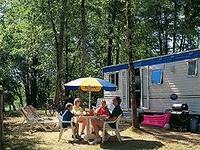Keycamp says greys are greener
 While Heathrow’s Climate Camp seems to be full of twenty and thirty somethings passionately campaigning to save the environment, a recent survey by self-catering holiday specialist, Keycamp, shows that it is actually the older generation that is proving greener.
While Heathrow’s Climate Camp seems to be full of twenty and thirty somethings passionately campaigning to save the environment, a recent survey by self-catering holiday specialist, Keycamp, shows that it is actually the older generation that is proving greener.Seven out of 10 of today’s consumers are interested in environmental issues, but when it comes recycling, being environmentally friendly and the reduction of carbon emissions, older people are more actively ‘green’ than the younger generation.
While the majority of respondents are willing to make changes to their habits to become greener, the research found that it was people in their late fifties who were more likely to take an active part in adopting a greener lifestyle than those under 35. The research showed:
- 70% of 55-64 year-olds always recycle at home compared to 30% of 18-24 year-olds
- 37% of 55+ age group always donate to green charities compared with 10% of the youth
- The younger generation prefers baths to showers with less than one third of young people always taking a shower compared with 56% of the older respondents.
- Over one third of both age groups always buying local produce
Keycamp, whose camping holidays have a low impact on the environment, questioned over 1,000 people to gain greater insight into green attitudes and the desire to protect the planet while on holiday.
Preservation of forests was of utmost importance to all those questioned, closely followed by protection of wildlife and control of pollution. On average the older generation gave each action a higher importance rating than younger people, while women gave greater importance to these factors than men.
Dave McKenna, Keycamp’s Marketing Manager, comments: “As an eco-conscious company, Keycamp is pleased to see that an increasing number of people are committed to saving the planet. We were surprised though to see that the younger members of the population aren’t being as actively green as the older generation, who are showing the greatest commitment to changing their habits.”
The majority of those interviewed said they would change their habits to become greener if it suited them, while a quarter of those surveyed said they would pay more for goods and services if they felt it would protect the environment.
59% of respondents would consider taking an eco holiday in the future, with 77% prepared to consider paying more to go ‘green’ while holidaying.
Some respondents saw being green in a negative light, feeling that being told to protect the environment was marketing spin and something that cannot be altered by individuals. 71% believed that commercial organisations and industry should absolutely play a role in helping to protect the planet.
Keycamp plans to use this research to refine its approach to eco-tourism and improve the options for holidaymakers to explore the idea of a trip that is closer to nature. Already the company has a series of measures allowing consumers to enjoy a more sustainable holiday. The self-catering specialist is now able to offer rail travel throughout Europe and optional donations can be made at the time of booking to Climate Care to offset carbon emissions from driving or flying and to The Travel Foundation to support sustainable tourism.
The European camping specialist also has nine Green Key sites in its programme, which are particularly eco friendly and have policies on waste, water and energy management that take a real priority.
A seven night break from 28 August at Le Vieux Port at Messanges in Gascony, one of Keycamp’s Green Key sites, will cost from £595 per family of two adults and up to four children staying in a Villanova mobile home. Prices include midweek return Dover-Calais ferry crossings.
Visit Keycamp.co.uk to make your booking.

